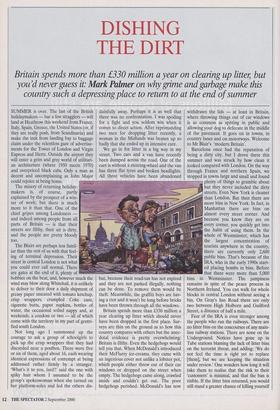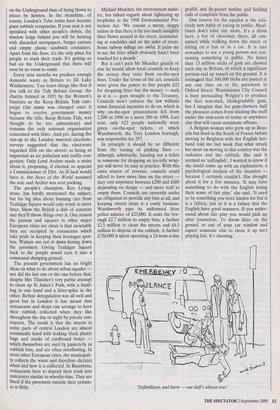DISHING THE DIRT
Britain spends more than £330 million a year on clearing up litter; but
you'd never guess it Mark Palmer on why grime and garbage make this
country such a depressing place to return to at the end of summer
SUMMER is over. The last of the British holidaymakers — bar a few stragglers — will land at Heathrow this weekend from France, Italy, Spain, Greece, the 'United States (or, if they are really posh, from Scandinavia) and make the trek from landing bay to baggage claim under the relentless gaze of advertise- ments for the Tower of London and Virgin Express and Hertz. Outside the airport they will enter a grim and grey world of utilitari- an architecture (where 1950 meets 1970) and overpriced black cabs. Only a man as decent and uncomplaining as John Major could rejoice at being home.
The misery of returning holiday- makers is, of course, partly explained by the prospect of a win- ter of work; but there is much more to it than that. One of the chief gripes among Londoners and indeed among people from all parts of Britain — is that their streets are filthy, their air is dirty, and the people are pretty bloody too.
The Blahs are perhaps less famil- iar than the rest of us with that feel- ing of terminal depression. Their street in central London is not what you could ever call normal. There are gates at the end of it, plenty of bobbies on the beat, and, however much the wind may blow along Whitehall, it is unlikely to deliver to their door a daily shipment of greasy paper smeared with tomato ketchup, crisp wrappers, crumpled Coke cans, cigarette butts, paper napkins, bottles of water, the occasional soiled nappy and, at weekends, a condom or two — all of which come with the territory in my part of gentri- fied south London.
Not long ago I summoned up the courage to ask a group of schoolgirls to pick up the crisp wrappers that they had discarded near a postbox. There were five or six of them, aged about 16, each wearing identical expressions of contempt at being addressed rather firmly by a stranger. `What's it to you, lard?' said the one with spiky hair whom I assumed to be the group's spokeswoman when she turned on her platform-soles and led the others dis- dainfully away. Perhaps it is as well that there was no confrontation. I was spoiling for a fight and you seldom win when it comes to direct action. After reprimanding two men for dropping litter recently, a woman in the Midlands was beaten up so badly that she ended up in intensive care.
We go in for litter in a big way in my street. Two cars and a van have recently been dumped across the road. One of the cars is without a steering-wheel and the van has three flat tyres and broken headlights, All three vehicles have been abandoned but, because their road-tax has not expired and they are not parked illegally, nothing can be done. To remove them would be theft. Meanwhile, the graffiti boys are hav- ing a riot and it won't be long before bricks have been thrown through all the windows.
Britain spends more than £330 million a year clearing up litter which should never have been dropped in the first place. Sur- veys are thin on the ground as to how this country compares with others but the anec- dotal evidence is pretty overwhelming: Britain is filthy. Even the hedgehogs would tell you that. When McDonald's introduced their McFlurry ice-creams, they came with an ingenious cover not unlike a lobster pot, which people either threw out of their car windows or dropped on the street when empty. The hedgehogs came along, crawled inside and couldn't get out. The poor hedgehogs perished. McDonald's has now withdrawn the lids — at least in Britain, where throwing things out of car windows is as common as spitting in public and allowing your dog to defecate in the middle of the pavement. It goes on in towns, in country lanes and on motorways. Welcome to Mr Blair's 'modern Britain'.
Fear of the IRA is even stronger among the people who run the railways. There are no litter bins on the concourses of any main- line railway stations. There are none on the Underground. Notices have gone up in Tube stations blaming the lack of litter bins on the terrorist threat, and adding: 'We do not feel the time is right yet to replace 'them], but we are keeping the situation under review.' One wonders how long it will take them to realise that the risk to their `customers' is minimal, and that the ban is risible. If the litter bins returned, you would still stand a greater chance of killing yourself on the Underground than of being blown to pieces by Semtex. In the meantime, of course, London's Tube trains have become giant rubbish receptacles. If your seat is not sprinkled with other people's debris, the window ledge behind you will be heaving with discarded newspapers, burger cartons and empty plastic sandwich containers. Apart from the floor, it's the only place for people to stash their trash. It's getting so bad on the Underground that there will soon be no room to vomit.
Every nine months we produce enough domestic waste in Britain to fill Lake Windermere. You learn things like that if you talk to the Tidy Britain Group, the charity formed in 1955 by the Women's Institute as the Keep Britain Tidy cam- paign (the name was changed once it began to receive government money because the title, Keep Britain Tidy, was thought to be too admonitory) and remains the only national organisation concerned with litter. And yet, during the run-up to the London mayoral elections, surveys suggested that the electorate regarded filth on the streets as being as important as air pollution and traffic con- gestion. Only Lord Archer made a noise about it, proposing, if elected, to appoint a Commissioner of Dirt. As ill luck would have it, the News of the World assumed the role and Archer was sent packing.
The people's champion, Ken Living- stone, has hardly mentioned the subject, but his big idea about banning cars from Trafalgar Square would only result in more litter. Show the British a slab of concrete and they'll throw things over it. One reason the piazzas and squares in other major European cities are clean is that invariably they are occupied by restaurants which take pride in keeping their frontages spot- less. Waiters are out at dawn hosing down the pavement. Giving Trafalgar Square back to the people would turn it into a communal dumping ground.
The present government has no bright ideas on what to do about urban squalor nor did the last one or the one before that, despite Mrs Thatcher's very public attempt to clean up St James's Park, with a hand- bag in one hand and a litter-spike in the other. Refuse deregulation was all well and good but in London it has meant that restaurants and shops can arrange to have their rubbish collected when they like throughout the day or night by private con- tractors. The result is that the streets in some parts of central London are almost continually lined with leaking black plastic bags and stacks of cardboard boxes which themselves are used by passers-by as rubbish bins, and are often overflowing. In most other European cities, the municipali- ty collects the waste and therefore dictates when and how it is collected. In Barcelona, restaurants have to deposit their trash into containers similar to wheelie-bins. They are fined if the pavement outside their premis- es is filthy. Michael Meacher, the environment minis- ter, has talked vaguely about tightening up loopholes in the 1990 Environmental Pro- tection Act. 'We remain a messy, sloppy nation in that there is far too much unsightly litter blown around in the street, accumulat- ing at roadsides and on the sides of rivers. Some railway sidings are awful. It pains me to see the litter which obviously hasn't been touched for a decade.'
But it can't pain Mr Meacher greatly or else he would allow local councils to keep the money they raise from on-the-spot fines. Under the terms of the act, councils were given the power to fine people £25 for dropping litter but the money — such as it is — goes straight to the Treasury. Councils won't enforce the law without some financial incentive to do so, which is why on-the-spot prosecutions fell from 2,500 in 1990 to a mere 500 in 1998. Last year, only 422 people nationally were given on-the-spot tickets, of which Wandsworth, the Tory London borough, was responsible for 297.
In principle it should be no different from the issuing of parking fines although, admittedly, handing out a ticket to someone for dropping an ice-lolly wrap- per will never be easy in practice. With this extra source of revenue, councils could afford to have more bins on the street they cost anywhere between £200 and £600 depending on design — and more staff to empty them. Councils are currently under no obligation to provide any bins at all, and keeping streets clean is a costly business. Wandsworth pays its uniformed litter police salaries of £23,000. It costs the bor- ough £2.7 million to empty bins, a further £2.5 million to clean the streets and £4.5 million to dispose of the rubbish. A further £750,000 is spent operating a 24-hour-a-day graffiti and fly-poster hotline and fielding calls of complaint from the public.
One reason for the squalor is the rela- tively new habit of eating in public. Meal- times don't exist any more. It's a drink here, a bar of chocolate there, all con- sumed while walking down the street or sitting on a bus or in a car. It is rare nowadays to see a young person not con- suming something in public. No fewer than 13 million sticks of gum are chewed each day in Britain, of which a significant portion end up tossed on the ground. It is estimated that 300,000 blobs are pasted at any one time on to the pavement in Oxford Street. Westminster City Council is busy persuading Wrigley's to produce the first non-stick, biodegradable gum, but I imagine that for gum-chewers half the pleasure comes from sticking the stuff under the arm-rests of trains or anywhere else that will cause maximum offence.
A Belgian woman who grew up in Brus- sels but lived in the South of France before moving to Brighton with her English hus- band told me last week that what struck her most on moving to this country was the rudeness and the rubbish. She said it seemed so `unEnglish'. I wanted to know if she could come up with an explanation, a psychological analysis of the situation because I certainly couldn't. She thought about it for a few minutes. 'It may have something to do with the English losing their sense of fair play,' she said. 'It used to be something you were known for but it is a fallacy, just as it is a fallacy that the English have good manners. If you under- stood about fair play you would pick up after yourselves. To throw litter on the ground or out of your car window and expect someone else to clean it up isn't playing fair. It's cheating.'
`Defibrillator, and hurry — our shift's almost over.'



























































 Previous page
Previous page